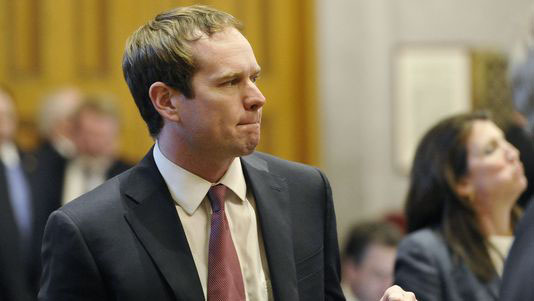Ex-lawmaker Jeremy Durham violated state campaign finance law possibly as many as 500 times, including spending more than $10,000 of campaign funds illegally to buy an airplane ticket for his wife, custom suits, spa products and sunglasses, according to a state campaign finance audit released Wednesday.
He also used campaign money for more mundane bills, including lawn care and paint for his home office, the audit shows.
Durham made at least 55 illegal purchases using money given by donors; the state report outlines 39 expenses, but some include multiple purchases. The former Franklin lawmaker also used campaign funds to invest more than $100,000 in the company of a wealthy GOP donor, loan nearly $30,000 to a professional gambler who has a criminal past and loan $25,000 to his wife, auditors found.
Durham paid himself $7,702 from his campaign account for expenses he’d already been reimbursed for by the state, according to the audit. The practice is more commonly known as double-dipping.
"At the same time Mr. Durham was receiving per diem reimbursements he was also charging meals and such expenses as travel expenses to his campaign account on the same day," said Drew Rawlins, executive director of the Bureau of Ethics and Campaign Finance.
Public records not affiliated with the state’s investigation into Durham’s campaign finances show he received more than $44,000 in per diem reimbursements from 2012 to 2016.
The audit could be used by state or federal law enforcement to bolster investigations into possible additional wrongdoing by Durham.
Peter Strianse, a criminal defense attorney representing Durham, said his client had not been given adequate due process before the release of the report.
Overall, the 38-page audit from the Tennessee Registry of Election Finance outlines 12 main findings related to Durham’s campaign finances. Those include:
- Receiving $5,500 in contributions above the legal limit from multiple donors;
- Not reporting $36,335 in donations and $10,624 in interest earned on investments;
- Not disclosing the names of several contributors;
- Not retaining sufficient records of expenses.
Related: Read the complete Jeremy Durham campaign finance audit
The report indicates Durham broke at least six individual state laws, but the board said there were up to 500 violations based on Durham breaking the same laws many times. Almost all violations of campaign finance law are punishable with fines.
The audit is the culmination of an investigation that began in June after Tennessee Attorney General Herbert Slatery revealed a former Durham employee alleged Durham gave him money that was intended to look like a legitimate campaign expense when in reality it was for Durham's now-closed title company.
The attorney general’s probe, which found Durham had inappropriate sexual contact with at least 22 women, was initiated after a Tennessean investigation revealed three women received late-night lewd text messages from Durham.
After hearing an overview of the report, the board said Durham could potentially be fined for each violation.
"It looks like upwards of 500 or more individual violations," said Patricia Heim, a board member.
In addition to the illegal use of campaign finances, the audit details how Durham invested more than $100,000 in Life Watch Pharmacy, a company owned by Andrew Miller, a prominent Republican donor who has advocated for anti-Islam policy in the state.
That confirms a September investigation by The Tennessean that showed Durham invested campaign funds into Miller’s company.
The report also states David Whitis, a professional gambler who has a criminal record, received three checks totaling $29,800 from Durham’s campaign account. This confirms a Tennessean report earlier this week showing Whitis, 41, received more than $20,000 in campaign funds.
Two of the checks to Whitis indicate the funds are a “loan to friend.” Additional information provided to the auditors by Durham states the money was “capital for a startup venture.” There was no additional information as to the nature of the business.
“A loan to friend with campaign funds is not an allowable campaign expense, not an ordinary or necessary expense associated with being an officeholder but a personal decision,” the report states.
Read more:
Jeremy Durham gave thousands in campaign funds to pro gambler
Read the full Durham audit
Names, companies included in Durham audit
How Durham spent his campaign money illegally
The report states investigators asked Durham for Whitis’ contact information but Durham didn’t provide it. Whitis has not responded to multiple Tennessean requests for comment.
Durham wrote a $25,000 check in August 2015 from his campaign account to his wife, Jessica, the report states. Durham told investigators the money also was related to a loan.
Jessica Durham, an optometrist with a practice in Green Hills, paid back $5,000 of that money Oct. 31, 2015, the report states. A line of credit from the campaign to the candidate “appears to be in violation” of campaign finance law, the report states.
An initial update from the registry found a $191,000 discrepancy between Durham’s bank account and his campaign finance report. It wasn’t immediately clear if the state has resolved the discrepancy, but there didn’t appear to be a reference to that specific amount in the final report.
Durham did not attend the meeting and has repeatedly denied wrongdoing.
In a surprise move, Durham's attorney Strianse did attend. Before the registry discussed the audit, Strianse objected to the report's release, saying he and Durham didn't think it was fair because they were not allowed to provide their objections. Durham also tried to block the release of the AG's report last summer with a similar objection but failed.
Despite the fact that the auditor said Durham and Strianse were interviewed before the release of the audit, Strianse called it a “mischaracterization” that Durham was given a chance to offer an adequate response.
Board members said Wednesday's hearing adhered to common practices, including making the audit public.
The board issued show cause notices on all 12 major findings and agreed to allow Durham and his attorney until May to respond to the audit. The registry issues show cause notices to candidates and political action committees when it believes there may have been a violation of campaign finance law. It's the beginning of the formal process needed to possibly issue fines.
Durham may attend the registry's June meeting, when it will discuss the show cause, Strianse told reporters.
Strianse said he thought his client wasn’t afforded due process or fairness because it was premature to release the report without Durham’s response.
“It would be akin to someone who works for a newspaper, who puts together a draft of a story and they don’t even get a chance to check it for any errors, proofread it in any way, the editor of the newspaper doesn’t get to look at it and it just gets published. It goes out into the domain as if it is a fully baked cake and correct in all respects,” Strianse said.
“We raised some significant challenges to the draft report that has now been made public. … I think it's fundamentally unfair to have an individual to be confronted with a report that they have not been given an adequate opportunity to respond to.”
Strianse said he tried to present a “laundry list” of concerns with the report to the board at least two weeks ago. Staff told him it would be more appropriate to present those issues later in the process, he said. When talking with reporters, however, Strianse wouldn’t details what specific problems he had with the report.
“There may have been mistakes that have been made, and obviously we’d like an opportunity to correct those mistakes. If there’s poor record keeping that needs to be corrected. But some of the broad positions that are taken by the registry in the report, I don’t know if they’re supported by the law or the statute,” Strianse said.
Despite the registry delaying formal action by imposing penalties on Durham, there was a brief effort to recommend the audit immediately be sent to law enforcement officials, including the Williamson County district attorney and the Board of Professional Responsibility. That effort failed.
"You’d be hard to assume based on this audit that there is not some question as to the action of this particular individual and his account may not breach a trust," said Tom Lawless, registry secretary, adding that it would ultimately be up to Williamson County District Attorney Kim Helper or the state legal board to determine whether Durham committed any illegal acts.
Durham also is the subject of an FBI probe into possible bribery, mail fraud and wire fraud, according to a copy of a federal subpoena obtained by The Tennessean. He was expelled from the legislature in September.
Strianse said he had no additional information about the FBI investigation.
Reach Dave Boucher at dboucher@tennessean.com or 615-259-8892 and on Twitter @Dave_Boucher1. Reach Joel Ebert at jebert@tennessean.com or 615-772-1681 and on Twitter @joelebert29.


